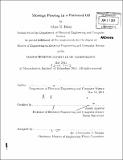| dc.contributor.advisor | Anant Agarwal. | en_US |
| dc.contributor.author | Belay, Adam M. (Adam Matthew) | en_US |
| dc.contributor.other | Massachusetts Institute of Technology. Dept. of Electrical Engineering and Computer Science. | en_US |
| dc.date.accessioned | 2011-10-17T21:22:35Z | |
| dc.date.available | 2011-10-17T21:22:35Z | |
| dc.date.copyright | 2011 | en_US |
| dc.date.issued | 2011 | en_US |
| dc.identifier.uri | http://hdl.handle.net/1721.1/66407 | |
| dc.description | Thesis (M. Eng.)--Massachusetts Institute of Technology, Dept. of Electrical Engineering and Computer Science, 2011. | en_US |
| dc.description | Cataloged from PDF version of thesis. | en_US |
| dc.description | Includes bibliographical references (p. 55-59). | en_US |
| dc.description.abstract | The fos project aims to build a next generation operating system (OS) for clouds and manycores with hundreds or thousands of cores. The key design tenant of fos is to break operating system services into collections of distributed system processes that communicate with message passing rather than shared memory. This microkernel-based design has the potential for better performance and more efficient use of architectural resources. This is because each isolated address space can be scheduled on a separate dedicated core - It is anticipated that assigning entire cores to specific system processes will become feasible in the near future given the trend of increasing abundance of cores per die and in the datacenter. Cache locality in particular benefits from this approach, as user applications no longer compete with the operating system for on-core cache resources. However, for such benefits to be fully realized, the message passing system must be sufficiently low latency. Otherwise, too much time will be spent transfering requests between cores. For this thesis, a high-performance message passing system for fos is developed and evaluated. The system supports a variety of messaging mechanisms, including a kernel messaging transport optimized for one-off communications, a low latency user messaging transport tailored to more frequent communications, and inter-machine messaging over TCP network sockets. Experiments show that the user messaging transport can be used to make core-to-core system calls with comparable latency to the trap-and-enter procedure of conventional system calls in monolithic OSes. Thus the latency of messaging to a different core is sufficiently low to allow for the locality benefits of fos's distributed OS services to overshadow any negative impact of messaging costs. | en_US |
| dc.description.statementofresponsibility | by Adam M. Belay. | en_US |
| dc.format.extent | 59 p. | en_US |
| dc.language.iso | eng | en_US |
| dc.publisher | Massachusetts Institute of Technology | en_US |
| dc.rights | M.I.T. theses are protected by
copyright. They may be viewed from this source for any purpose, but
reproduction or distribution in any format is prohibited without written
permission. See provided URL for inquiries about permission. | en_US |
| dc.rights.uri | http://dspace.mit.edu/handle/1721.1/7582 | en_US |
| dc.subject | Electrical Engineering and Computer Science. | en_US |
| dc.title | Message passing in a factored OS | en_US |
| dc.title.alternative | Message passing in a factored operating system | en_US |
| dc.type | Thesis | en_US |
| dc.description.degree | M.Eng. | en_US |
| dc.contributor.department | Massachusetts Institute of Technology. Department of Electrical Engineering and Computer Science | |
| dc.identifier.oclc | 755082145 | en_US |
